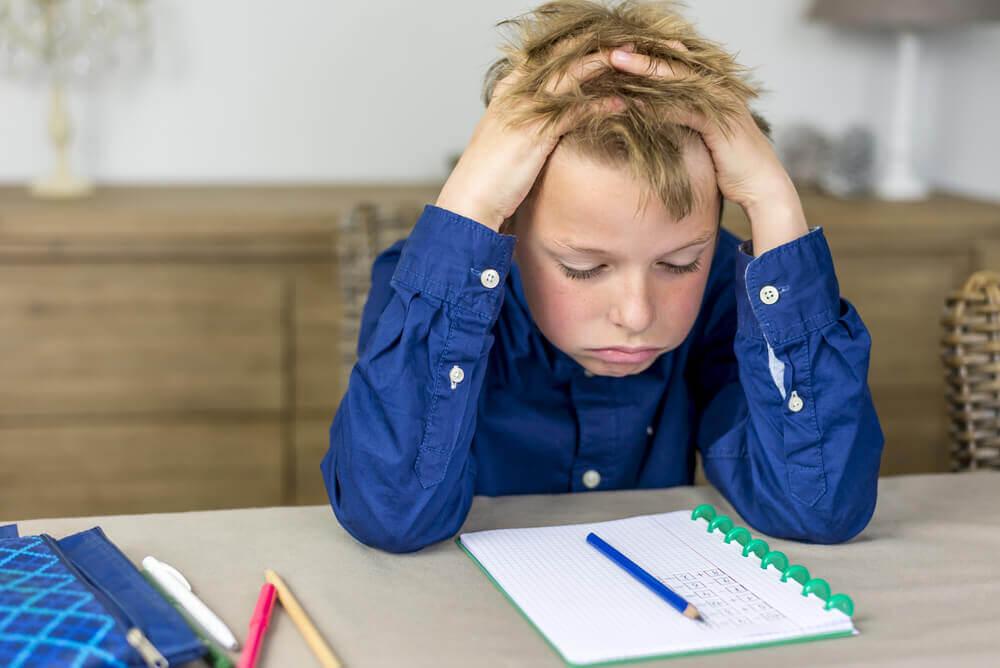How Do Excess Extracurricular Activities Affect Your Children?

Today, we want our children to have a good education, to play sports, to learn languages, to develop their artistic skills, and much more. But we don’t realize that an excess of extracurricular activities isn’t positive for them.
We parents want them to have everything that we didn’t have, but have we stopped to think about what they want? Could that excess of extracurricular activities do them more harm than good?
Perhaps little ones have already gotten used to that rhythm of life, but deep down, they want to have a little more time to play. So, we’re actually overloading them with activities and although we think it’s beneficial, it’s not at all.
Excess extracurricular activities, are they good or bad?
There’s no black and white in this regard and we can’t classify the activities themselves as good or bad. It depends more on considering and respecting the will of children than on anything else.
It’s clear that it’s positive for children to have free time for leisure and to optimize their development, but the problem lies in incurring excesses.
In this regard, it’s important to let children choose what to do in their free time and encourage them to play, as that should be their main task. Especially up to 6 years, children should spend at least two hours a day playing and spend more time with their parents.
Playing is a need for minors and this action should be done freely, spontaneously, with other children or relatives, and if possible, outdoors. In addition, it’s also necessary to promote boredom, as this state encourages the development of creativity and encourages imagination.
The point is that today, children don’t have time to be bored and their imaginations are less and less developed.
If we want to give our children the best, we must be aware that excess extracurricular activities aren’t the key. And, in the long run, it ends up causing them stress. The best thing, without a doubt, is to give them time to play.

What consequences can excess extracurricular activities have on children?
In case you haven’t realized it, children experience daily stress similar to that of adults, with long working hours and a schedule full of obligations. Apparently, we’ve forgotten that they’re children and that this amount of daily tasks produces anxiety and discomfort that’s difficult to handle.
Some of the symptoms associated with childhood stress due to excessive extracurricular activities are the following:
- Headaches
- Trouble sleeping
- Nightmares
- Loss of appetite
- Stomach aches
- Anxiety
- Excess of worries
- An inability to relax
- Difficulty controlling their emotions
- Aggressive behavior
- Regression to behaviors from earlier stages of development
- Humor changes
- Concentration problems
- Attention problems
- Mental and physical exhaustion
Many children today leave school, eat, and already have to get going to get to their extracurricular activities. And worst of all, often it’s not a single activity, but several, back to back.
And what about your child’s homework? Have you considered that it’s also part of your child’s extracurricular tasks? It’s not only an activity, it’s also part of your child’s obligations.
So, where’s the time to play or share family activities? Although we sometimes think that play is a waste of time, we’re quite wrong. Play has numerous benefits for the integral development of children.
Tips for choosing extracurricular activities for children
The first thing you have to think about is that when a child plays, he matures. Above all, when the activity they do is to their liking.
If we have teenage children, another thing to keep in mind is that extracurricular activities should be linked to the subjects that they’re passionate about. This way, they develop their vision of the world, improve their social relationships, and share their talents with other boys their age.
We’re going to give you some tips when choosing the most appropriate after-school activity for your children:
- Avoid saturating the schedule with activities: They have to have time to rest, do homework, be with their friends, and even get bored.
- Always pay attention to the tastes and personality of your children: Let them choose the extracurricular activity that they like the most rather than imposing your own tastes or preferences.
- Don’t force them to go if they don’t want to.
- Be on the lookout for any symptoms of childhood stress.
- Limit extracurricular activities to reinforce academic content: Kids already spend a lot of time at school for this purpose and have a whole life ahead of them to add learning.

About the effects of excess extracurricular activities…
Now, you’ve been able to see that an excess of extracurricular activities isn’t beneficial. But by this, we don’t mean that these activities are bad in and of themselves. What we’re referring to is that improper use of any of them can cause effects that are counterproductive and harmful.
You need to strike a balance between educational and recreational tasks, in order to provide a full and healthy development of children.
In short, extracurricular activities have to be to the child’s liking and add something good to their life. Don’t stress them out from an early age.
Today, we want our children to have a good education, to play sports, to learn languages, to develop their artistic skills, and much more. But we don’t realize that an excess of extracurricular activities isn’t positive for them.
We parents want them to have everything that we didn’t have, but have we stopped to think about what they want? Could that excess of extracurricular activities do them more harm than good?
Perhaps little ones have already gotten used to that rhythm of life, but deep down, they want to have a little more time to play. So, we’re actually overloading them with activities and although we think it’s beneficial, it’s not at all.
Excess extracurricular activities, are they good or bad?
There’s no black and white in this regard and we can’t classify the activities themselves as good or bad. It depends more on considering and respecting the will of children than on anything else.
It’s clear that it’s positive for children to have free time for leisure and to optimize their development, but the problem lies in incurring excesses.
In this regard, it’s important to let children choose what to do in their free time and encourage them to play, as that should be their main task. Especially up to 6 years, children should spend at least two hours a day playing and spend more time with their parents.
Playing is a need for minors and this action should be done freely, spontaneously, with other children or relatives, and if possible, outdoors. In addition, it’s also necessary to promote boredom, as this state encourages the development of creativity and encourages imagination.
The point is that today, children don’t have time to be bored and their imaginations are less and less developed.
If we want to give our children the best, we must be aware that excess extracurricular activities aren’t the key. And, in the long run, it ends up causing them stress. The best thing, without a doubt, is to give them time to play.

What consequences can excess extracurricular activities have on children?
In case you haven’t realized it, children experience daily stress similar to that of adults, with long working hours and a schedule full of obligations. Apparently, we’ve forgotten that they’re children and that this amount of daily tasks produces anxiety and discomfort that’s difficult to handle.
Some of the symptoms associated with childhood stress due to excessive extracurricular activities are the following:
- Headaches
- Trouble sleeping
- Nightmares
- Loss of appetite
- Stomach aches
- Anxiety
- Excess of worries
- An inability to relax
- Difficulty controlling their emotions
- Aggressive behavior
- Regression to behaviors from earlier stages of development
- Humor changes
- Concentration problems
- Attention problems
- Mental and physical exhaustion
Many children today leave school, eat, and already have to get going to get to their extracurricular activities. And worst of all, often it’s not a single activity, but several, back to back.
And what about your child’s homework? Have you considered that it’s also part of your child’s extracurricular tasks? It’s not only an activity, it’s also part of your child’s obligations.
So, where’s the time to play or share family activities? Although we sometimes think that play is a waste of time, we’re quite wrong. Play has numerous benefits for the integral development of children.
Tips for choosing extracurricular activities for children
The first thing you have to think about is that when a child plays, he matures. Above all, when the activity they do is to their liking.
If we have teenage children, another thing to keep in mind is that extracurricular activities should be linked to the subjects that they’re passionate about. This way, they develop their vision of the world, improve their social relationships, and share their talents with other boys their age.
We’re going to give you some tips when choosing the most appropriate after-school activity for your children:
- Avoid saturating the schedule with activities: They have to have time to rest, do homework, be with their friends, and even get bored.
- Always pay attention to the tastes and personality of your children: Let them choose the extracurricular activity that they like the most rather than imposing your own tastes or preferences.
- Don’t force them to go if they don’t want to.
- Be on the lookout for any symptoms of childhood stress.
- Limit extracurricular activities to reinforce academic content: Kids already spend a lot of time at school for this purpose and have a whole life ahead of them to add learning.

About the effects of excess extracurricular activities…
Now, you’ve been able to see that an excess of extracurricular activities isn’t beneficial. But by this, we don’t mean that these activities are bad in and of themselves. What we’re referring to is that improper use of any of them can cause effects that are counterproductive and harmful.
You need to strike a balance between educational and recreational tasks, in order to provide a full and healthy development of children.
In short, extracurricular activities have to be to the child’s liking and add something good to their life. Don’t stress them out from an early age.
All cited sources were thoroughly reviewed by our team to ensure their quality, reliability, currency, and validity. The bibliography of this article was considered reliable and of academic or scientific accuracy.
- Jiménez Jiménez, K. J., Díaz Flórez, M., Álvarez Pai, D. L., Bernal López, A. D. P., & Vargas Amézquita, S. L. (2012). Determinar la relación existente entre el estrés y las actividades extraescolares en los niños de 5 a 7 años de edad (Doctoral dissertation).
- Abadía Grasa, S. J., & Vicente Hernández, D. ¿Qué aporta la realización de actividades extraescolares físico deportivas al alumnado de 5º y 6º de primaria? REVISTA EDUCATIVA Marzo 2021/ Vol 2 LAS COMPIS.
- Buzyn, E. (2016). Papá, mamá,¡ dejadme tiempo para mi!. Parkstone International.
- Honoré, C. (2013). Bajo presión: cómo educar a nuestros hijos en un mundo hiperexigente. RBA Libros.
This text is provided for informational purposes only and does not replace consultation with a professional. If in doubt, consult your specialist.








